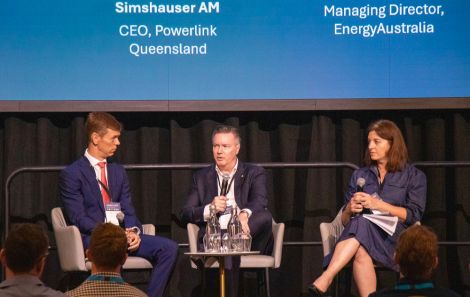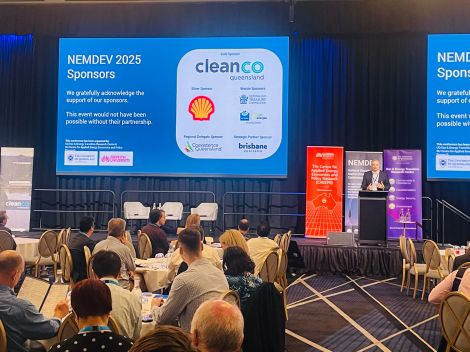Supporting the transition to a low-carbon energy supply by providing expert analysis, insights, advice and capability-building
The global energy sector is entering a transition phase as the market moves towards a low carbon economy. With this shift comes technological, economic and social disruption.
CAEEPR aims to maximise the energy sector's potential to achieve emission reductions and contribute to inclusive, sustainable and prosperous businesses and communities while building capacity in the electricity economics. CAEEPR uses a national electricity market model to develop and analyse different scenarios to assess different policy positions for generator dispatch and transmission efficiency.
Enrolments for our Executive Education courses now open
The current state of Australia's energy sector
Our aims
Support
Support the transition to more sustainable and less carbon-intensive power generation and transmission system and address the accompanying policy, economic, technical and political challenges within the industry.
Thought leadership
Provide thought leadership and industry engagement strategies that our members can design and deliver best practice energy services with reduced emissions.
Maximise potential
Maximise the energy sector's potential to achieve stable and reliable electricity contributing to inclusive, sustainable and prosperous businesses, communities and places.
Foster innovation
Foster holistic and integrated approaches that seek to address political and policy impediments to a successful transition to electrification and green hydrogen.
Develop partnerships
Promote research partnerships and collaboration for the use of sustainable energy in electricity markets across Asia and the Pacific.
Encourage dialogue
Encourage dialogue between members, researchers, industry and government departments to promote policy debate, research partnerships and collaboration.
Develop member capabilities
Enhance members' and researchers' skills for adaptability and technical prowess to support sectoral changes in technology, business models, regulations, and electricity markets.
Develop new standards
Create and uphold advanced Electricity Market models for analyzing wholesale spot and future markets, power system reliability, integration of dispatchable and intermittent resources, and network capacity adequacy.
Sustainable Development Goals
Griffith University is aligned with the United Nation’s Sustainable Development Goals (SDGs) and is committed to addressing the global challenge of developing and implementing sustainable energy solutions that reduce greenhouse gas emissions and ensure access to clean energy for all.
Our research expertise
The Centre for Applied Energy Economics and Policy Research is well positioned to support the transition to a low-carbon energy supply by providing expert analysis, insights, advice and capability-building. The Centre will work with the electrification of industry and organisations to support the future of the Australian economy.
The Centre is hosted by Griffith Business School and is accumulating a group of internationally-recognised specialist researchers in the field of applied energy economics and policy research complementary to our members. Our key areas of strength include:

Wholesale Electricity Market Modelling
CAEEPR provides wholesale electricity market modelling with demonstrated experience and capability in conducting simulation modelling encompassing optimized dispatch outcomes relating to generation, spot prices, power flows on transmission branches flows, network adequacy and network augmentation, operating at a nodal level of detail.

Energy, Renewables and Climate Change Policy
CAEEPR provides high-quality economic analysis to inform public policy relevant to the clean energy and just transition options currently or potentially available to the electricity and broader energy sectors within Australia and to inform investment decisions.

Electricity Market
CAEEPR provides high-quality economic analysis to inform wholesale electricity market policy and design through assessing financial/dispatch outcomes, marginal losses and marginal loss factors and different models of transmission access.
Griffith and UQ host landmark NEMDEV Conference shaping Australia’s energy future
Leaders from across Australia’s energy sector gathered in Brisbane last week for the National Electricity Market Development Conference 2025 (NEMDEV2025), hosted by the Centre for Applied Energy Economics and Policy Research, in collaboration with the University of Queensland’s Gas & Energy Transition Research Centre.
The two-day conference brought together policymakers, regulators, academics, and industry professionals to explore reform pathways for Australia’s National Electricity Market (NEM) amid the country’s accelerating energy transition.
Higher Degree by Research
A variety of research opportunities exist for Honours, Masters, PhD and post-doctoral research students
Our team
Meet our team of dedicated experts, who are driving our research success. Our team consists of Griffith staff members, Adjunct Professors and Visiting Fellows (a visitor program is available upon request).
If you'd like more information on becoming an Adjunct of the Centre for Applied Energy Economics and Policy Research, please contact our secretariat via email at CAEEPR@griffith.edu.au.
Follow the links to individual profile pages for more information about our research strengths, key projects, collaborations and research supervision opportunities.
Professor Magnus Söderberg - Director
Professor Magnus Söderberg comes to us from Sweden where he worked at Halmstad University. Previously he was responsible for developing and teaching the B.Sc. in Energy Management at the University of Southern Denmark, the only undergraduate education in Scandinavia that focuses on energy economics/business. His current research interests include regulation approaches, benchmark methods and consumer responses to electricity prices.
Associate Professor Alexandr Akimov - Deputy Director
Associate Professor in Finance at Griffith University, he holds a Ph.D. in financial economics from the University of New England as well as Chartered Financial Analyst and Energy Risk Professional designations. In addition to academic appointments, Alexandr has held the risk management appointments at the National Bank of Uzbekistan. His two main areas of research are energy and development finance.
Professor Paul Simshauser AM
Paul Simshauser AM is a Professor of Economics at Griffith University where he specialises in Energy Economics and Energy Policy. He has more than two decades of experience in the energy sector. His prior roles include Director-General of the Department of Energy and Water Supply and Chief Economist with one of Australia’s largest utilities, AGL Energy and General Manager Energy Trading at Stanwell Corporation.
Associate Professor Tim Nelson
Tim is an Associate Professor at Griffith University and is widely published in Australian and international peer-reviewed journals. He has presented at conferences in Australia and throughout Asia and Europe. He holds a PhD in economics for which he earned a Chancellors Doctoral Research Medal and a first class honours degree in economics. Tim is also a fellow of the Governance Institute (FGIA and FCIS) and a graduate of the Australian Institute of Company Directors (GAICD).
Associate Professor Joel Gilmore
Associate Professor Joel Gilmore is passionate about providing critical analysis that helps industry and government transition our energy sector to a low emissions future. He is particularly interested in the integration of renewable generation into our grids, how electricity markets could (or should) evolve over time to provide the right signals for investors, and how investors can best structure their projects to obtain – and hence deliver – maximum value.
Associate Professor Duy Nong
Duy is an Associate Professor working with CAEEPR based in Brisbane. He specialises in computable general equilibrium modelling development for economic, climate change, environmental, and energy studies. He is pursuing the development of a set of global and national computable general equilibrium and partial equilibrium models to study the impact of climate variability on agricultural and food systems.
Dr Nancy Spencer - Principal Research Fellow
Nancy Spencer’s career started with the Queensland Electricity Commission before returning to QUT to complete her PhD in econometric time series.. She has extensive knowledge and expertise in developing and implementing complex social, economic and crisis policy solutions. At Griffith, Nancy continues her leadership in evidence-led policy development engaging cross-faculty teams. Nancy is a graduate of the Australian Institute of Company Directors (GAICD) and serves on several not-for-profit boards.
Dr Reza Hajargasht - Senior Lecturer
Dr Reza Hajargasht specialises in efficiency and productivity analysis, with his work published in leading economics journals. In energy economics, his current research interests include econometric modelling of energy markets, measuring of the efficiency of energy firms, price gouging behaviour in fuel markets and cross-country studies of renewable versus non-renewable energy sources. Reza’s works have been published in top econometrics journals and top field journals related to well-being and productivity including Journal of Econometrics, Journal of Business and Economic Statistics, and Journal of Productivity Analysis.
Dr Phil Wild - Senior Research Fellow
Dr. Phil Wild has a PhD from the University of Queensland specialising in the field of macro-economic modelling. His main area of research since 2009 has been in Energy Economics with a particular focus on wholesale electricity market modelling of the Australian National Electricity Market (NEM), integration of variable renewables (e.g. wind, solar PV, hybrid gas-solar thermal), energy policy issues linked to that research agenda and econometric modelling of National Energy Market (NEM) spot price and load time series data.
Adjunct Professor John Pierce AO
John Pierce is an Adjunct Professor of Economics at Griffith University and has over thirty years’ experience in economics, public policy and finance, governance and industry reform. He has extensive experience as a senior advisor to governments in the areas of fiscal, energy and climate change policies. He has previously been Chairman of NSW Treasury Corporation and served for more than a decade as New South Wales Treasury Secretary.
Adjunct Associate Professor Richard Meade
Richard is an Adjunct Associate Professor at Griffith University, and over more than 30 years has published or advised on current and future competition and regulation issues in energy, transport and infrastructure sectors, as well as on decarbonisation and climate change policy. He regularly presents to scholarly, policy, and practitioner audiences in Australasia and elsewhere.
Dr Huyen Nguyen - Adjunct Industry Research Fellow
Dr Huyen Nguyen is an Adjunct Industry Research Fellow at Griffith University. Huyen is the Energy Market Modelling lead in the Energy team at Queensland Treasury Corporation. Huyen holds a PhD in computational neuroscience from the University of Queensland. Huyen’s interests include green hydrogen and ammonia supply chains, solving seasonal renewable energy imbalances, sector coupling, future energy market design, techno-economic assessment of different decarbonisation options and green financing.
Dr Lucas Skoufa - Adjunct Research Fellow
Dr. Lucas Skoufa is an Adjunct Research Fellow at Griffith University with over 40 years of expertise in power energy. With extensive experience at Rio Tinto Alumina, he brings deep knowledge of turbine technologies and the flexibility of alumina loads. Dr. Skoufa has conducted technical assessments and economic evaluations of power generation technologies and propulsion systems for civilian and military applications.
Adjunct Associate Professor Phil Hirschhorn
Adjunct Associate Professor Phil Hirschhorn is a faculty member at Griffith University. Phil is currently serving as a panel member for the influential 2025 National Electricity Market Review. In addition to his full-time commitment to the NEM Review, he holds the position of Managing Director at Energy Path, where he provides strategic economic and management consulting services to chief executives in the energy sector.
Events
CAEEPR's Higher Degree Research Seminar - March 2026
10 Mar 2026 3 pm – 10 Mar 2026 5 pm
The seminar will provide an opportunity to engage with emerging research, reflect on current policy and market challenges, and connect with...
Environmental and Climate Economics Course
22 Apr 2026 10 am – 24 Apr 2026 1 pm
This course covers global environmental problems, different types of market failures, environmental externalities, market-based instruments, economic...
Energy Economics Course
22 Apr 2026 2 pm – 24 Apr 2026 5 pm
This course explores energy demand, supply, markets, and policies, covering topics like oil, natural gas, electricity, and nuclear power, alongside...
The Research Frontier in Energy and Policy Course
11 Nov 2026 2 pm – 13 Nov 2026 5 pm
This course is for senior professionals seeking a concise, research-driven update on the electricity sector. It distills the latest academic and...
Latest news
Griffith Business School honoured on Australia Day
26 Jan 2026
Griffith University community members have been recognised for their outstanding service and...
Griffith subjects score top marks in latest Times Higher Education rankings
21 Jan 2026
Griffith University’s commitment to teaching and student education has been acknowledged in the...
China’s Belt and Road engagement hits record levels in 2025
20 Jan 2026
China’s global economic footprint through the Belt and Road Initiative (BRI) reached its highest...
Nature therapy integrated in clinical health care could boost mental health
05 Jan 2026
Integrating nature-based therapies into clinical health care could help to address...





